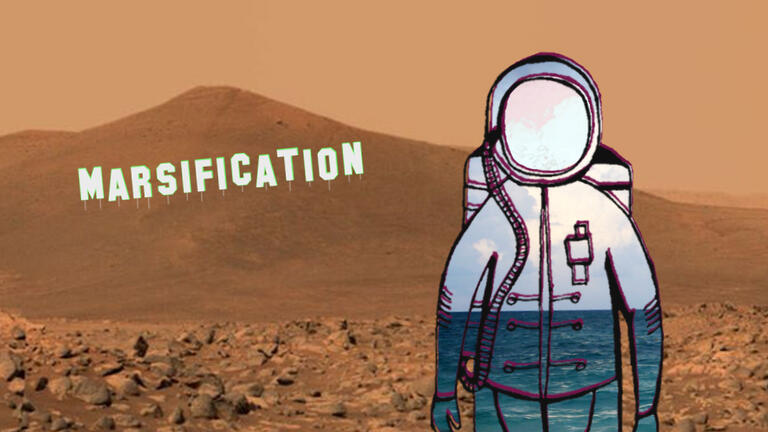Transformative Leadership alum Cynthia Huie, M.A. '24, brings creativity and connection to the San Francisco small-business community.

In Conversation: CIIS Professor and Alum Create Album Featured on the BBC
Zara Zimbardo and Lily Stone collaborated on the new album Marsification: A tale of planetary grief, featured on Radio 4’s Short Cuts.
Editor’s Note: The following article is a conversation with Zara Zimbardo, an Adjunct Senior Lecturer in Interdisciplinary Studies in the School of Undergraduate Studies and a CIIS alum, and therapist and sound artist Lily Sloane who is also a CIIS alum. The two collaborated on an album, Marsification: A tale of planetary grief, the title of which is a neologism that Zara created with the Bureau of Linguistical Reality to name dynamics of colonial and techno-salvationist fantasies of making Mars habitable while the Earth is being rendered increasingly uninhabitable. One of the tracks, “My Body Is Of Earth” was featured earlier this year on an episode of BBC Radio 4’s Short Cuts called “Earth, Water, Sky.”
How would you describe the concept of Marsification for those who are not familiar with it?
Today we are being increasingly bombarded by the idea that humanity can and should expand to Mars. NASA, the European Space Agency, and India are among those committed to exploring the red planet, while billionaires such as Elon Musk have made their hopes to colonize and “Occupy Mars” explicit. Meanwhile, our own planet is so unstable and our environment so threatened that many people find it easier to imagine moving to another world than to deal with the mess we've made of this one. There's a name for this phenomenon: Marsification.
Marsification is a neologism that Zara and others created with the participatory art project The Bureau of Linguistical Reality, which creates new language for emotions and psychological states associated with climate change and environmental upheaval/destruction. Marsification and its verb tense Marsify were coined to critique the ideology that the colonization of Mars is a viable strategy for dealing with the ecological crisis on Earth, the idea that we can somehow reset civilization just by running away somewhere new. More specifically, it is a critique of the whole Mars-will-save-us narrative that is being pushed by a number of tech-billionaires (or “billionauts”).
Mars colonization, long the province of science fiction, is increasingly becoming science non-fiction as the seductive prospect of settling Mars is portrayed and marketed as viable and desirable in the face of environmental collapse on our home planet. We created the word to help people name how fantasies of turning Mars into a backup Earth are distracting us from the fact that global capitalism is rapidly turning Earth into Mars. The term picked up steam through media attention and climate activist networks, and New Scientist selected it as one of their words of the year for 2023 in science and technology that highlight important parts of our changing society.
The full definition is as follows, which in itself is the final track of the album:
- The expansion of colonial fantasy beyond the atmosphere of the Earth. “Manifest Destiny to the stars”. It is an extension of the phenomena of colonizing ‘new lands’ often accompanied by narratives of starting life anew, a civilizational reset, an apparent freedom from the social and political problems colonizers believe they are ‘leaving behind.”
- The various cultural, political and economic processes through which techno-utopian fantasies divert our attention from the dominant global economic system’s erosion of the life-support systems of Earth.
- The drive to turn relatively lifeless Mars into a new Earth while effectively turning biodiverse Earth into Mars. The process of making Mars habitable while Earth is being rendered increasingly inhabitable.
- The delusion that the blank slate of the red planet will be an escape from inescapable problems on our home planet. For example, the idea that humans could escape to Mars if we destroy our own climate.
Please describe the ways in which our planet Earth is becoming increasingly uninhabitable?
The easiest go-to scientific snapshot is probably the planetary boundaries framework which defines the nine biophysical limits that define the "safe operating space" for humanity (aka retaining Holocene conditions). Beyond those boundaries, as we see so obviously with climate breakdown or biodiversity loss, we start to lose the ability of the current Earth inhabitants to thrive. As of 2023 we have crossed six of the nine planetary boundaries as documented by the scientific think tank the Stockholm Resilience Center.
But as the ecological crisis on Earth worsens we now see how this dream to terraform Mars into a new Earth is increasingly a distraction. This is why we created the term Marsification to help name the irony and draw people’s attention to the fact that the same economic system that created billionaires pitching space colonizing fantasies is what is actually in the process of turning biodiverse Earth into relatively lifeless Mars. Techno-salvationist dreams diverting our attention from ecological nightmares. When we say increasingly uninhabitable, this is due to excessive extraction of finite natural resources, unprecedented habitat destruction, contamination of freshwater, topsoil depletion, desertification, ocean warming and acidification, mass species extinction, and ever accelerating climate destabilization.
Please describe the process by which you developed the concept for the 16 vignettes.
In 2019 on Lily’s radio show Radical Advice, Zara came on as a guest for a conversation focused on the psychology of space colonization fantasies. Like any good therapeutic process we looked into the patient’s history and in the case of the United States, there was Manifest Destiny staring us in the face as a historically repetitive obsessive compulsive condition. That idea continued to compel us.
That year, the neologisms Marsify and Marsification were coined as a political intervention. We continued to explore these concepts together over several years and what began as an idea for a short meditative audio piece inviting listeners to hold the contradictions of toxic colonial continuities, longing and liberation, starry imagination and oceanic grief, blossomed out into this field of tracks. We realized that the range of what we wanted to express would best live in the format of a full concept album audio artwork.
As we would dive into a particular theme, such as space cowboys, therapy addressing planetary relationship dynamics, desires to transcend physical limits and the earthliness of human bodies, we would create poetry, script short pieces and record improvised dialogue in different characters, which Lily would then craft into brilliant audio landscapes to invite different textures of emotion. All recording happened with professional sound equipment in a padded small closet in Lily’s apartment. We edited tracks until they landed in a place where the emotional resonance and complexity we were aiming for was met.
The process included research into the dominant discourse of space colonization, perspectives on decolonizing Mars, critiques of settling Mars, and liberatory visions of space as ancestral global commons, as well as immersion in media current events, such as the international headlines made by the billionaire space race in 2021 with launches by Jeff Bezos (Blue Origin), Richard Branson (Virgin Galactic) and the Inspiration4 mission with Elon Musk’s SpaceX.
From the beginning our intention has been to create space to feel this planetary moment in all its dissonance. There is massive momentum heading to Mars. There is massive inertia to stabilize Earth’s biosphere. There is danger in unprocessed feelings. There is danger in unexamined assumptions and un-listened to ghosts that haunt the present. This album is an offering of “critical feeling” at a pivotal time on our home planet.
We were delighted to collaborate with a web designer and graphic artist to give this album a home on an adorable interactive website, which provides resources, context, full credits for all who contributed to this, and links to all streaming platforms where the album can be accessed
How were you able to preview “My Body is of Earth” for BBC Radio 4?
We submitted a track from the album, “My Body Is Of Earth,” to BBC Radio 4’s Short Cuts, which was accepted and featured this summer on an episode called “Earth, Water, Sky.” The producers did a stunningly creative job of curation with two other poignant audio pieces to create a gorgeous episode. We were honored to have our piece featured with so much integrity in this context.
How has it been received?
Listeners of Marsification: A tale of planetary grief have shared profound experiences that include intense somatic wonder at their inner landscapes, a surfacing and curious questioning of their own space fantasies, and contact with currents of deeper emotions related to our climate reality. There has been great enthusiasm for the content explored and the ways in which a range of humor, gravity and whimsy holds these vital themes. We have heard from many that Marsification engages the listener not as a passive audience member but as an active participant. In addition to individual listening journeys, the album is being used for listening parties in people’s homes and event spaces, with time for reflection and discussion afterwards. This is very much how we hope people will engage with this artwork, to have personal engagement with all that it stirs up, and to use it as a springboard for community dialogue about this moment we are in as a species.
Tracks from the album have been used in workshops on climate anxiety and climate grief as well as somatic presencing. Radio DJs have played pieces on their stations. Currently we are collaborating on gallery listening events, a potential installation, and designing facilitation guides for people who wish to hold community dialogues. We welcome creative ideas for how this audio artwork can be used, built upon and adapted, or collaborated with in other mediums such as video and theater.
Related Academic Program
Related News
A panel hosted by the Department of Human Sexuality gathered notable alumni from the Ph.D. program to discuss their change-making work and research.
At each CIIS Open House event, a community panel of faculty and alumni discusses what drew them to CIIS and their experiences at the University.



